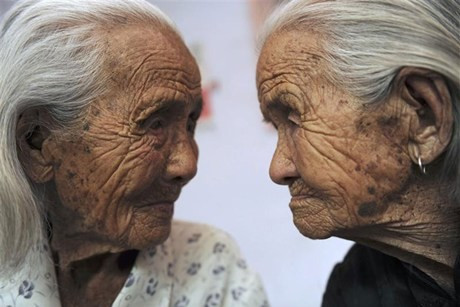China: Parents Can Sue Children Who Don't Visit
Beijing acts on Western influence on Chinese youth threatening culture of respect for parents

China's age-old culture of respect for the elderly is being steadily eroded by the influence of the West.
With the burden of caring for older people threatening social cohesion as well as economic prosperity, Beijing has acted to bring its errant youth to book.
Children who neglect their parents will now find themselves on the wrong side of the law after legislation was introduced to enforce filial responsibility. Grown-up children who have flown the nest could be sued by parents for neglect if they fail to vist or keep in touch.
A law spelling out the duty of care that children owe their ageing parents has been tightened to emphasise parents' right to the support of their offspring in old age.
The amended legislation was aimed at raising awareness, said Xiao Jinming, a law professor at Shandong University who was involved in drafting the new wording.
"It is mainly to stress the right of elderly people to ask for emotional support. We want to emphasise there is such a need," said Xiao.
The number of people aged 60 and above is expected to leap from 185 million to 487 million - 35% of the population - by 2053, according to figures from China's National Committee on Ageing.
The gap in the ratio between old and young is widening, as the one-child rule continues to apply to most urban families, while life expectancy has risen from 41 to 73 over five decades.
That poses serious threats to the country's social and economic stability, as the burden of supporting the growing number of elderly must be borne by a shrinking working-age population.
China's elderly were already able to sue their adult children for emotional support under previous laws. The Law of Protection of Rights and Interests of the Aged allowed elderly parents to sue their children for emotional support but court officials generally tried to settle such cases informally.
Decades of market reforms
Cleaning lady Wang Yi, 57, who lives alone in Shanghai, said the new law was "better than nothing". Her two sons work several hundred miles away in southern Guangdong province and she sees them only at an annual family reunion.
"It is too little, for sure. I think twice a year would be good," she said. "We Chinese people raise children to take care of us when we are old."
Although respect for the elderly is deeply engrained in Chinese society, three decades of market reforms have accelerated the breakup of the traditional extended family.
There are few affordable alternatives, such as retirement homes, while safety nets in the form of social security remain weak.
However, Zhang Ye, 36, a university lecturer from eastern Jiangsu Province, said the new law was "unreasonable" as it put too much pressure on children who had left home in search of work.
"For young people who are abroad or work far away from their parents, it is just too hard and too expensive to visit ," said Zhang.
"I often go to visit my parents and call them. But if a young person doesn't want to, I doubt such a law will work."
© Copyright IBTimes 2025. All rights reserved.





















